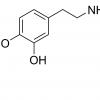I have thought for some time about the effects of long term allergies to processed foods. I am talking severe sufferers. Those who suspect that their autism/adhd/schitzo/fibro is caused or greatly aggravated by these food allergies.
As many of you know, these proteins, the gluten and casein, act like opioid in the body, mimicking the natural enkephalin and anadamide etc.
Well, also many people know that these compounds cause constipation and sedation, something that real narcotics do as well.
So I have considered.
a) you have a severe inflammatory chronic allergic reaction to these over many years, perhaps a decade that damages the villi of the stomach
b) you cannot feel a lot of the pain because the wheat and dairy sedate the pain and act as mood enhancers
c) you stop eating the dairy and gluten, but you have a biomechanical "set point" so to speak for the rate at which your digestive system processes food, that is totally adapted to compensate for these opioid like foods. Now you have IBS, and your gut is compensating for years of desensitization. It is in a hyper-visceral pain sensitive state.
d) the pain sensitivity causes an neuroendocrino-immuno cascade of cytokines and neurotransmitters, histamine, NGF, serotonin 5-ht3/ht4 receptor stimulation, tons of adrenaline- all leading to chronic dysregulation of the HPA-axis and psychological-physiological changes within the brain itself. The brain has to compensate to deal with the pain, and you become desensitized to emotion, sucked into a stupor and depression.
e) You realize that this condition closely resembles narcotic withdrawal. You may need opioids to make up for the lack of dairy and gluten.
f) In a separate post, I speculated on how oxytocin and endogenous opioids were more important for cognitive capacity than perhaps even dopamine. http://www.longecity...__fromsearch__1
Would someone in this situation have to take some low dose opioid to compensate? perhaps until the nuero-biomechanical aspect of the GI tract was reprogrammed?



















































